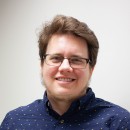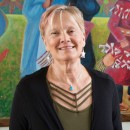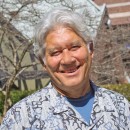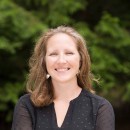School of Social Work News
Pages
 Finn Bell Named a Robert Wood Johnson Foundation Social Work Health Futures Lab Fellow
Finn Bell Named a Robert Wood Johnson Foundation Social Work Health Futures Lab FellowFinn Bell, Joint PhD student in Social Work and Sociology, has been named a Social Work Health Futures Lab Fellow. He joins a national cohort of 26 social work experts from around the U.S. and Canada, who will work together on topics ranging from social media to climate justice. Sponsored by the Robert Wood Johnson Foundation (RWJF), this initiative aspires to help prepare a new generation of the profession.
"For the past seven years, my community-engaged research has been motivated by trying to understand how communities can build the emotional, spiritual, and cultural sustenance necessary to effectively confront the climate crisis,” said Bell. “I am honored to have been selected as a RWJF Social Work Health Futures Lab Fellow, as it will give me the opportunity to receive specialized training in futures thinking and connect me with a cohort of social work leaders similarly committed to addressing the ‘wicked problems’ of the 21st century from an intersectional anti-racist lens."
- December 11, 2020
- Learn more »
- Showing Up for Racial Justice December Action Items
View the list of upcoming events and action items related to Showing Up for Racial Justice’s mission to motivate and share transformative education opportunities that sharpen the analysis, organizing skillsand leadership of white anti-racist organizers and the broader University of Michigan community.
- December 8, 2020
 Sandra Momper Appointed to U-M Anti-Racism Faculty Hiring Initiative
Sandra Momper Appointed to U-M Anti-Racism Faculty Hiring InitiativeAssociate Professor Sandra Momper has been appointed by Provost Susan Collins to the U-M’s Anti-Racism Faculty Hiring Initiative. The initiative, a component of the university’s multifaceted approach to addressing systemic racism, will bring over 20 new scholars with expertise in racial inequality and structural racism to schools and colleges across campus over three years. Members will review hiring proposals and make selections for funding for the first round of tenure track hires in January 2021.
In addition, she recently was appointed by Dilip Das, Assistant Vice Provost for Academic Affairs, U-M Office of Diversity, Equity & Inclusion to the Indigenous Leadership Group.
- December 3, 2020
- Learn more »
- Ahead Magazine Focusing on Social Work Research
Ahead (Issue 5) - In-depth views of social work research at the University of Michigan. This issue includes:
- December 3, 2020
- Learn more »
- Student Town Hall Follow Up Questions
The SSW administration has answered the questions presented at the Town Hall on October 20. The document details activities and planning completed by faculty, students and staff at SSW.
- December 2, 2020
- World AIDS Day 2020 — “Ending the HIV/AIDS Epidemic: Resilience and Impact”
It is with humility that I invite you to commemorate World AIDS Day 2020, “Ending the HIV/AIDS Epidemic: Resilience and Impact.” Each year on December 1, organizations and individuals across the world bring attention to the HIV epidemic, endeavor to increase HIV awareness and knowledge, speak out against HIV stigma and call for an increased response to move toward ending the HIV/AIDS epidemic.
What is World AIDS Day and Why Does It Still Matter?
World AIDS Day began in 1988, immediately inspiring people around the world to unite in order to fight the spread of the Human Immunodeficiency Virus (HIV) and to promote awareness about the plight of those who with Acquired Immunodeficiency Syndrome (AIDS). Today, World AIDS Day continues to give us opportunities to demonstrate love and support for people living with HIV, and to commemorate those who have died from AIDS-related complications.
HIV is transmitted through direct contact with infected blood, semen and/or vaginal fluids. Within a few weeks of infection, those infected may experience flu-like symptoms – fever, sore throat, and fatigue. HIV infection is typically asymptomatic until it progresses to AIDS – weight loss, fever or night sweats, fatigue and recurrent infections. For more information on transmission and symptoms, please go to Centers For Disease Control and Preventions HIV/AIDS Facts and Brochures. There is no cure or vaccine for HIV/AIDS. However, adherence to antiretroviral therapies (ART) can considerably slow the progress of the disease and prolong the individual’s life.
Two Pandemics Interconnect: HIV and COVID-19
Globally, an estimated 38 million people live with HIV and more than 35 million have died of AIDS complications in the past thirty years. As of December 1, 2020, there are approximately 63 million cases of COVID-19 and there have been nearly 1.5 million deaths worldwide. The geographic spread and the toll taken on vulnerable populations make HIV and COVID-19 two of the most devastating pandemics in history.
In the United States, HIV/AIDS disproportionately impacts Black communities. Black people account for about 13% of the U.S. population, but they represented 42% of new HIV diagnoses in 2018. COVID-19 also disproportionately affects Blacks people in the U.S. and abroad. Understanding the connection between these two pandemics is essential, as both clearly show us the need to remove structural barriers affecting the widespread transmission of disease across underserved communities.
These pandemics highlight the effects of anti-Blackness, racism, homophobia and transphobia, poverty and other forms of abuse and oppression that lead to a lack of access to prevention and care. Long-standing inequities have put oppressed groups at increased risk of COVID-19 infection and death. Those living with chronic conditions, such as HIV, are more vulnerable to COVID-19, due to recent disruptions in access to HIV treatments and preventive medications.
World AIDS Day reminds us that HIV is still with us. There is still a vital need to increase awareness, to fight HIV stigma and prejudice against vulnerable populations, and to improve the plight of those who are living with HIV/AIDS while confronting COVID-19.
What Can I do on World AIDS Day?
On World AIDS Day we can all show solidarity with the millions living with HIV. You may choose to wear a red HIV-awareness ribbon today or on any other day of the year. You may also ask yourself, “What can I do, with my capabilities, to help end the HIV/AIDS epidemic and to support those already suffering or at risk?”
Rogério Meireles Pinto
Associate Dean for Research and Professor of Social Work- December 1, 2020
 Tony Alvarez’s new book, “Adventure Group Psychotherapy an Experiential Approach to Treatment” is Published
Tony Alvarez’s new book, “Adventure Group Psychotherapy an Experiential Approach to Treatment” is PublishedLecturer Tony Alvarez’s new book, "Adventure Group Psychotherapy an Experiential Approach to Treatment" explores what is necessary for an experiential therapy group to function effectively, and the practical skills needed to inspire success.
"This inspiring and essential resource provides powerful tools and techniques for adventure therapy practitioners and students," said Will White, co-founder, Summit Achievement, and author of "Stories from the Field: A History of Wilderness Therapy".
- November 30, 2020
- Learn more »
 Terri Friedline's New Book "Banking on a Revolution Why Financial Technology Won't Save a Broken System" Published by Oxford Press
Terri Friedline's New Book "Banking on a Revolution Why Financial Technology Won't Save a Broken System" Published by Oxford PressAssociate Professor Terri Friedline’s new book, “Banking on a Revolution Why Financial Technology Won't Save a Broken System,” takes a critical look at advancements in financial technology (“fintech”) in the banking and financial industries, and makes the case for a more inclusive financial system. "Banking on a Revolution" is deeply rooted in theory and research, and it presents new interpretations of the climate crisis, student loan debt, and community benefits agreements and their relationships to the financial system. The book makes a compelling case for a revolutionized financial system that centers the needs, experiences, and perspectives of those it has historically excluded, marginalized, and exploited.
"To create a more equitable and democratized financial system, we need to shift the balance of power away from banks and lenders and toward people,” says Friedline. “Social movements can shift power imbalances and hold institutions accountable for the racist inequalities they have created — tasks for which fintech was not really designed."
- November 24, 2020
- Learn more »
- Michigan Senators: The election is over. Stop undermining the results.
Today's joint Oversight Committee hearing at 1 PM in the state legislature is not allowing public comments. Despite many local leaders across the state requesting public comments, the chairs of the committee are not allowing us to testify. Here's what you can do you to do:
Tell your story anyway. During the Wayne County Board of Canvassers, people offered powerful stories about voting for the first time, new citizens proudly casting their ballots, 90-year old elders making sure to vote despite the pandemic, Black voters refusing to be silenced. We want our legislators to address the COVID-19 crisis, not racist attacks on our democracy. Let them know!
Tweet at/tag the Chairs of the Committee with your #IfICouldTestify Story: Twitter: @SenEdMcBroom, @RepMattHall. Facebook: @SenEdMcBroom, @StateRepHall.
Share your #IfICouldTestify story on your personal social media: You can go live or create a short, 30-second video. You can write out your thoughts. However you do it, make sure to include #IfICouldTestify and focus on your story and the need to move forward together.
Email the Chairs of the Committee and Progressive:
- November 19, 2020
- SSW Joint PhD Program 2021 Doctoral Class Enrollment Announcement
This decision is now approved and final.
The Joint Program in Social Work and Social Science at the University of Michigan has decided to not enroll a new doctoral class for 2021. This is a difficult decision but given the impact of COVID on our current diverse student body, it is needed to provide them the best chance for success. This would be for one year. Next year we would resume enrolling students as we previously have. We currently do not plan to offer deferments to prospective students this year. There are only eight seats per year and if we defer students this year we would not have seats available next year.
We know this is a disappointment for those of you who would like to enroll this year, and for that we are sorry. However, we are committed first to our current students and assuring they have all the resources they need to be successful. We think this is one of the reasons you may be considering our program and would expect nothing less of us. These are hard times for everyone, which force all of us to make difficult decisions. We hope that you will be able to apply next year. You are very important to our future. At this time, we have to make the best decisions we can for our current students so that they can move forward and become the next leaders in the field of social work.
The MSW program is still admitting a cohort for fall 2021. Please consider applying to their program.
FAQ Regarding Students Who Have Applied
I have already applied to the program, will my application fee be refunded?
Yes, your application will be refunded if you applied to the Joint Program without applying to any other programs. This cannot occur until we get final approval from Rackham School of Graduate Studies.
I would still like to be considered for the MSW program, is this possible?
Yes, we would like to encourage prospective students to still apply to the MSW program. We will continue to forward any information you submitted to us to the MSW admissions team, and if you have any questions about your MSW application you can reach out to [email protected].
- November 10, 2020